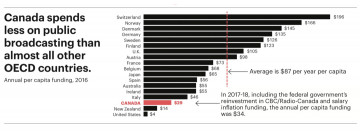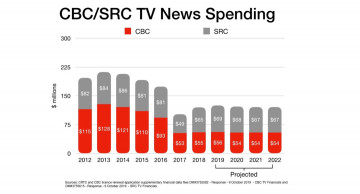CBC Licence Renewal
The review of the CBC’s broadcast licenses is the only time the CBC has to answer for its performance and discuss its future plans. Most importantly, it’s the only time when listeners and viewers can weigh in on what the CBC should be doing. This is our chance to influence the rules CBC must abide by.
It’s been seven years since the Canadian Radio-television and Telecommunications Commission (CRTC) last reviewed the CBC’s broadcast licenses; this is a rare, crucially important opportunity to have your say.
The downside of an open process is that it’s open to CBC’s enemies too. So far, CBC haters have dominated the consultations. This is a unique opportunity for us to tell the powers that be why our national public broadcaster is important to Canada. The anti-CBC crowd may not be huge but it is exceptionally vocal. We need to stand up for the silent majority of Canadians who cherish the CBC and want it to be stronger.
Your intervention will ensure the CRTC hears more than just the shrill voices of those who do not value public broadcasting. They are a small minority but they make a lot of noise.
FRIENDS’ latest poll shows broad support for the CBC:
- 84% think it is more important (60%) or as important (24%) to have a strong and independent CBC given that 250 newspapers have closed in Canada during the last 10 years.
- 77% have high trust and confidence in CBC/Radio-Canada to protect Canadian culture and identity on television.
- Nearly eight-in-ten respondents (79%) would advise their MP to vote in favour of increasing (46%) or maintaining (33%) CBC’s budget.
The CBC is asking for a five-year licence, but the elephant in the room is the pitiful levels of funding the federal government invests in public broadcasting. CBC remains one of the most poorly funded public broadcasters in the developed world. Such is the case even after the Trudeau government’s re-investment in 2016.
The CRTC has no meaningful authority over how much or how little the CBC is funded.

FRIENDS supports the strong public broadcasting Canadians deserve. Unfortunately, CBC management’s plant for the future is making problems related to its funding shortfall worse, not better.
In its application to regulators, CBC management is seeking to water down its Canadian content and local programming obligations and to grow its advertising revenues. Combined, these changes will likely lead to more repeats, more ads on CBC TV, more ads on digital platforms, and more digital services that are restricted to those who buy a subscription. If CBC management gets its way, our national public broadcaster will become less distinctive.
Specifically, the CBC is asking for permission to broadcast:
- less Canadian drama, documentary and comedy programs on primetime TV (when most people are watching), even less than private broadcasters are required to show
- less local news on TV
- no local non-news TV programs
- less children’s programming (actually it wants its obligation to produce children’s program to become a non-binding “expectation”)
We can only assume that CBC is asking for lower standards because it intends to deliver less of the programming that makes CBC distinctive. The CBC is even seeking to eliminate an expectation that it strives to exceed minimum standards, rather than just meet them.
This will make it even harder to distinguish the CBC from private broadcasters.
CBC is not just any broadcaster. But this fact does not seem to be recognized by current management whose licence renewal application suggests they are running the CBC just like any private broadcaster.
According to the Broadcasting Act, the CBC must “inform, enlighten and entertain” Canadians, and “reflect Canada and its regions to national and regional audiences, while serving the special needs of those regions”. Its programming must be “predominantly and distinctively Canadian”. And, CBC should “contribute to shared national consciousness and identity”.
To compensate for Canadian content reductions on TV and radio – currently enjoyed by tens of millions of Canadians – CBC management is proposing to do more programming on its digital platforms, where audiences are currently miniscule.
By its own accounting, CBC spends between $150 million and $300 million on digital activities, including over $150 million from its parliamentary appropriation1. In other words, CBC is spending about as much on digital activities, that attract very few viewers, as it does on radio, where the programming is very distinctive and audiences are large and loyal.
But the biggest issue is that digital broadcasting has been exempt from Canadian content and other rules for years, with broad and negative consequences for Canada. For example, this exemption lets Netflix, Canada’s largest broadcaster, off the hook for contributing to the production of Canadian programs, an obligation all Canadian broadcasters must comply with.
Now, CBC management is claiming that its digital service should enjoy the same exempt status as Netflix, Facebook and Google. Even worse, CBC brass believe that the CRTC has no business regulating these activities, and that they have no obligation to say how they are spending these dollars – our public dollars – in the digital domain.
FRIENDS has written to the CRTC to request that this information be made public. So far, they have not responded.
CBC should not be able to hide details of its plans and operations just because they are digital. They are publicly-funded. They should be accountable to Canadians. FRIENDS’ view is that the CRTC should treat digital and conventional broadcasting equally, and require foreign online media to pay up and follow our rules. CBC should not be hiding behind the same legal loopholes as Netflix and YouTube.

The CBC’s application reveals its plan to continue spending less on TV news. This exposes CBC management’s lack of commitment to local news. When she became CBC President in 2018, Catherine Tait said: “There is nothing more important than local stories and local news.” Ms. Tait also said: “If we don't reflect Canadians where they are, wherever they are, we are not doing our job.”
Clearly, those were empty words too.
FRIENDS has called on CBC management to make a sincere commitment to local news and information programs, and to back that commitment with real dollars. CBC must invest in the production and expansion of quality local services.
Strangely, the CBC is reluctant to disclose its most recent three-year strategic plan, choosing instead to release only a two-page summary of this key document on a flashy but fundamentally empty website. FRIENDS has written to the CRTC to suggest that this document is too important to be withheld during the licence renewal process, and to request that the CBC be required to make it available to all Canadians. So far, they have not replied.
Thankfully, the CBC is not asking for permission to insert ads into its radio programs during this licence term; its French and English radio networks will remain ad-free. At the same time, CBC management is not taking steps to reduce repeat programs on its radio networks.
CBC is seeking renewal of its audio and audio-visual licences for a five-year period.
Deadline for submission of interventions is 5 pm Pacific, 20 February 2020.
You can compose your submission here; FRIENDS will forward it to the CRTC in your name and we will provide copies to the CBC, as required by the CRTC.
The CRTC would also like to know if you are a Francophone living outside of the Province of Quebec or an Anglophone living in the Province of Quebec so it can better serve you.
Please email Jim Thompson at [email protected] if you would like to make an oral presentation to the CRTC at the public hearing. It starts 25 May 2020 at 9 a.m. at the Conference Centre, Phase IV, 140 Promenade du Portage, Gatineau, Quebec.
- Based on a comparison of the CBC 2018-19 Annual Report and CRTC Financial for the broadcast year 2018. [TBC] Given different year ends (March 31st for the Annual Report and August 31st for the CRTC broadcast year), and the limited financial disclosure provided by CBC, it is, however, impossible to obtain a fully accurate picture.


